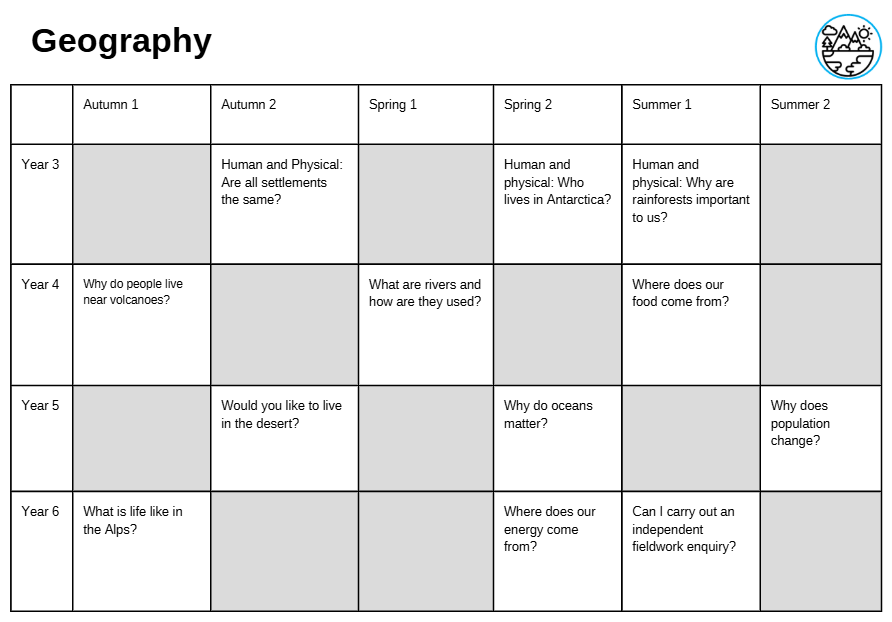Geography
Intent
Our Geography curriculum aims to motivate and inspire children to discover the world around them and beyond. We believe that we are guardians of God's precious world and our curriculum also aims to instil in children a sense of environmental responsibility at both a local and global level. We want to foster inquisitive, questioning learners who look closely at our world and begin to interpret what they see. In Geography, children develop confidence to question and observe places, measure and record necessary data in various ways, and analyse and present their findings. Our curriculum aims to build an awareness of how Geography shapes our lives at multiple scales and over time. Our curriculum encourages our children to articulate their thinking, to be brave in their advocacy for our world, and collaborate with others in field and group work.
Implementation
The National curriculum organises the Geography attainment targets under four subheadings or strands:
• Locational knowledge
• Place knowledge
• Human and physical geography
• Geographical skills and fieldwork
The Horsell Junior School Geography curriculum has a clear progression of skills and knowledge within these four strands across each year group. Geographical key concepts are woven across all units rather than being taught discretely. Locational knowledge, in particular, is reviewed in each unit to coincide with our belief that this will consolidate children’s understanding of key concepts, such as scale and place, in Geography.
Cross-curricular links are included throughout each unit, allowing children to make connections and apply their Geography skills to other areas of learning. Enquiry questions form the basis for each Geography unit, meaning that pupils gain a solid understanding of geographical knowledge and skills by applying them to answer enquiry questions. These questions are open-ended with no preconceived answers and therefore they are genuinely purposeful and engage pupils in generating a real change. In attempting to answer them, children learn how to collect, interpret and represent data using geographical methodologies and make informed decisions by applying their geographical knowledge.
Each unit contains elements of geographical skills and fieldwork to ensure that fieldwork skills are practised as often as possible. The Geography units follow an enquiry cycle that maps out the fieldwork process of question, observe, measure, record, and present, to reflect the elements mentioned in the National curriculum. This ensures children will learn how to decide on an area of enquiry, plan to measure data using a range of methods, capture the data and present it to a range of appropriate stakeholders in various formats. Fieldwork includes smaller opportunities on the school grounds to larger-scale visits to investigate physical and human features. Developing fieldwork skills within the school environment and revisiting them in multiple units enables pupils to consolidate their understanding of various methods. Lessons incorporate various teaching strategies from independent tasks to paired and group work, including practical hands-on, computer-based and collaborative tasks, to develop the pupils' articulacy and collaboration.
Geography at Horsell Junior school is taught across the academic year and units are mostly placed to alternate with History. Some units are sequenced together due to wider curriculum links to ensure lessons have high impact.

Impact
Pupils' understanding of Geography is constantly monitored through both formative and summative assessment opportunities. Each unit has a unit quiz and knowledge catcher, which are used at the end of each unit to assess children’s understanding, and to ascertain whether they have reached the required standard in Geography. Opportunities for children to present their findings using their geographical skills also form part of the assessment process in each unit.
At the end of their time at Horsell Junior, pupils should leave school equipped with a range of skills and knowledge to enable them to study Geography with confidence at Key stage 3.
By the end of Year 6, pupils will be able to:
- Compare and contrast human and physical features to describe and understand similarities and differences between various places in the UK, Europe and the Americas.
- Name, locate and understand where and why the physical elements of our world are located and how they interact, including processes over time relating to climate, biomes, natural disasters and the water cycle.
- Understand how humans use the land for economic and trading purposes, including how the distribution of natural resources has shaped this.
- Develop an appreciation for how humans are impacted by and have evolved around the physical geography surrounding them and how humans have had an impact on the environment, both positive and negative.
- Develop a sense of location and place around the UK and some areas of the wider world using the eight-points of a compass, four and six-figure grid references, symbols and keys on maps, globes, atlases, aerial photographs and digital mapping.
- Identify and understand how various elements of our globe create positioning, including latitude, longitude, the hemispheres, the tropics and how time zones work, including night and day.
- Present and answer their own geographical enquiries using planned and specifically chosen methodologies, collected data and digital technologies.
Please click on the document below to find out about the knowledge and skills taught in Geography across the key stage.
